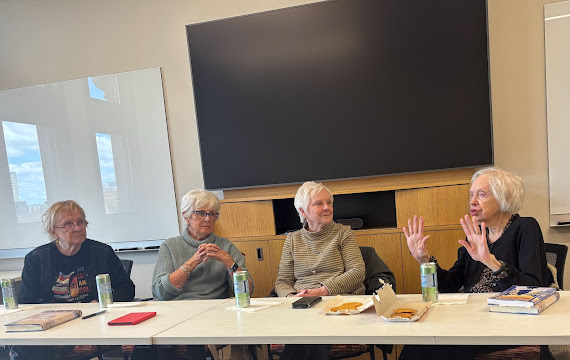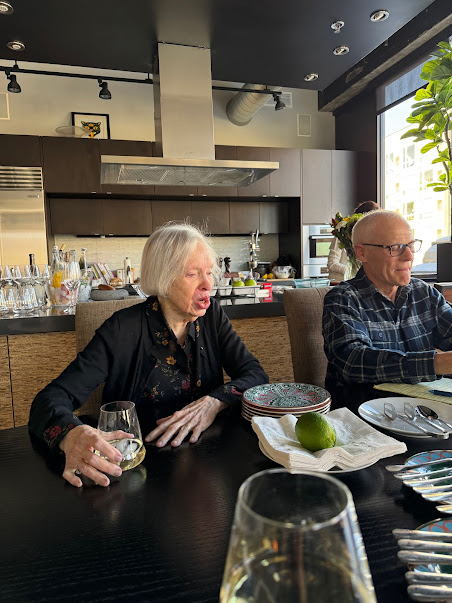Insights and Opinions
Our Next Read
 | ||
| Vicky provided the lovely cake. Margy provided the lovely venue. |
an imperfect book club diary
 | ||
| Vicky provided the lovely cake. Margy provided the lovely venue. |
From the publishers, brief descriptions of our two reads:
Sipsworth
"Following the loss of her husband and son, Helen Cartwright returns to the village of her childhood after living abroad for six decades. Her only wish is to die quickly and without fuss. She retreats into her home on Westminster Crescent, becoming a creature of routine and habit: “Each day was an impersonation of the one before with only a slight shuffle—as though even for death there is a queue.”Time of the Child
"From the author of This Is Happiness, a compassionate, life-affirming novel about the Christmas season that transforms the small Irish town of Faha.
Doctor
Jack Troy was born and raised in Faha, but his responsibilities for the
sick and his care for the dying mean he has always been set apart from
the town. His eldest daughter, Ronnie, has grown up in her father's
shadow, and remains there, having missed one chance at love – and passed
up another offer of marriage from an unsuitable man.
But in the Advent season of 1962, as the town readies itself for Christmas, Ronnie and Doctor Troy's lives are turned upside down when a baby is left in their care. As the winter passes, father and daughter's lives, the understanding of their family, and their role in their community are changed forever.
Set over the course of one December in the same village as Williams' beloved This Is Happiness, Time of the Child is a tender return to Faha for readers who know its charms, and a heartwarming welcome to new readers entering for the very first time."In a departure from our usual routine, we took a field trip to the University of Minnesota, where we met in the recently renovated Pillsbury Building in honor of one of our esteemed members, Shirley Garner. A long-time professor of English at the University, Shirley was instrumental in helping to make the stunning renovation of this building a reality.
Also, due to heavy-duty March schedules all around, we combined our March and April reads into a single session. After welcoming home our good friend Vickie and killing a fair amount of time as we waited for our people to find parking on a crowded campus, we dug in.
+ One of the main drawbacks to reading and discussing two books at once is also one of the unexpected advantages. On the downside, we slip quickly past one of them to get to the discussion of the second one quickly. On the upside, we find the parallels between them, the common themes that unite otherwise very different stories. On this day, our discussion definitely fell into the second camp.
+ Linda felt that Sipsworth and Time of the Child are perfect companion novels. Both feature a character late in life, adrift without purpose. And then both characters are given a tremendous gift after everything else seems to have passed them by. Unwittingly, and in some ways against her better judgment, Helen Cartwright takes on the care and feeding of a common field mouse, which she names Sipsworth. Gradually, simple maintenance becomes much more until we find them watching TV together on the couch. In Time of the Child, Dr. Jack Troy has spent a lifetime caring for the sick in his small community with little money or friendship to show for it. All he has is the company of his daughter Ronnie, whose future happiness he fears he has destroyed through his discouragement of an early suitor. But the unexpected delivery of an abandoned baby to his door reignites a fire he's lost long ago. In both cases, the choices made by these main characters take them someplace other than they had planned, and both in satisfying ways.
+ After reading Sipsworth, Vicky reread the opening pages and was struck by the similarities between Helen and the mouse. Helen has lived in her house for three years now, but it's still empty and she knows no one in the village. And the mouse is also in a strange place, found in a box of someone else's junk. He becomes an effective metaphor for Helen -- he's transplanted, he's unimportant, until suddenly he is.
+ The structure of Sipsworth, in Margy's opinion, is something special. "It's so in the moment. There are no flashbacks. We don't know much about Helen. We don't know how her son died. It's just day by day and then we have a few days when it's just blank." Simple, straightforward sentences carry the reader forward. This structure gives the reader a deep dive into Helen's reality and highlights how absolutely alone she is, until through her own unexpected actions, a community starts to rally around her.
+ One of the few memories Helen returns to often is one of being trapped in a well when she was a child. We wondered about the significance of that memory. Why does the author want us to know this? How does it color Helen's world, even more so than the unexplained death of her son and whatever it is that happened to her husband? This led to a bit of a side conversation in which Liz recounted surviving a tornado and Chris shared a story about being trapped in a malfunctioning elevator, and how those are things one never forgets.
+ Jocey pointed out that Helen's story at the beginning is the common tale of the old woman, a creature who is invisible and of no use to anyone anymore. The village has ignored her for three years. It's only through her own forays into heretofore unvisited places in the village, to get what she needs for Sipsworth, that she makes connections and the community begins to rally around her.
+ Turning then to Time of the Child, we immediately set about pointing out all the ways in which these two novels are completely different. While the prose in Sipsworth moves along at a spare and simple clip, each of Williams' sentences is a world unto itself. His Faha world is almost entirely internal. There is little dialogue since nothing in Faha is ever uttered but is only implied, through a look, an absence, a shoulder raised, and the occasional "Oh, now." Williams is a deep and unstinting observer of human motive and, throughout his prose, finds ways to communicate the deepest truths without words ever being exchanged.
+ Time of the Child is best savored rather than just read. There's no way one can read it quickly. Every sentence requires concentration. Liz said: "Every sentence is so deep and so carefully written, I feel like it must be exhausting to write like that. It's all so slow and so beautiful." She admitted to occasionally skipping over a paragraph, feeling the need for a break. Chris said the book routinely put her to sleep, three pages being her limit. Vicky pointed out that that's not necessarily a bad thing, stating her opinion that sometimes we place too much emphasis on plot and story. Chris said "He's such a good writer, you want to stop after every sentence and think about it."
+ Williams' constructions are surprising and delightful. Very early on in the work, on page 14, he describes the moment in which Dr. Troy and Ronnie leave the church after morning services. "Circumvention was a preferred way in Faha, so, between the doctor's care and the church gate, those parishioners who wanted a word did not gather, but stood sentry in by the wall or on the fringes of conversations in which they played a non-speaking part. These were always women. Although invisible to Church and State, it was women who knitted the country together, and in Faha, on Sunday morning after Mass, you could see the needles."
+ There was some comparison made between Time of the Child and This is Happiness, another Williams work we read for an earlier session. Both take place in the same community and feature many of the same characters, which is apparently Williams' intention as he continues his writing career. Both Chris and Liz found Time of the Child to be a more compelling read as the stakes in Child are higher.
+ Both Sipsworth and Time of the Child deal, in their own ways, with the pain and joy of aging. At the close of Child, Dr. Troy has these thoughts: "Only through the birth of a child, he thought, is the lure of death conquered. It was a statement worthy of his father. And he recalled then the fantastical notion of the old man, who, in his last year, claimed that the purpose of aging was to grow into your soul, the one you have been carrying all along. Yes, Jack Troy thought. The one you had as a child." We can all learn from these words.
For our May meeting, we will read How to Find Your Way in the Dark by Derek Miller.
 |
| The habits of serious readers (Vicky). |
 | |||
| Shirley holding forth. |

Liz and Chris pretending they are in charge.
 |
| Lois making her opinions known. |

Thrilled to have found a parking spot.
 |
| Poetry and art come together in Pillsbury Hall. |
Do I appreciate the way the sun streams in to the front room where I sit to have my morning coffee? And the aroma that rises from my coffee as I hold the warm cup between my hands? Yes, I do.
And, what about time spent in the garden, pruning, staking, weeding, making a home for beauty, vanquishing weeds and volunteer tree seedlings, and clearing a path for flowers to bloom? Most definitely.
But there is one thread that knits through all of the many pleasures life affords me — time spent with books.
Not long ago, I counted the books I own. There were 937. But that was after sending four cartons – 200 books in all – to a local thrift store. So that makes less than 1,000, which isn’t so bad, right? Bad in the sense of insane or profligate.
It’s not that you’d ever notice my books unless you were looking. There are two tidy bookcases in the ground floor hallway, another two on the lower level, several small bookcases that serve as end tables in bedrooms, and then various drawers that hold purpose-specific volumes. Spiritual reading goes in the drawer next to the bed, “how to paint” or draw or do calligraphy or knit or make baskets out of things that grow outside are all organized by subject in the sewing room. Gardening books are by the back door and cookbooks sit near the kitchen.
The coffee table books are a history of my various interests over time. How to survive in the wilderness, what the voyageurs ate, all of the satellites exploring the galaxy along with their pictures of Neptune, Mars and Saturn, the Jeffers petroglyphs, the basics of weather, how to build a tiny home, Russian folk tales, antique postcards from around the world, the principles of aerodynamics, the Ojibway people, the history of cheese, the contents of the Musee d’Orsay in Paris, to name a few.
Books on writing are up in the tower, which is where I do my writing when I feel inspired or disciplined. It’s not really a tower, but I like to call it that, having read most of Dickens and all of Jane Austen. Foreign itineraries, atlases and books on how to speak German, Italian, French, and Russian are in the guest room, the idea being that since said guests have traveled to get to me, they are most likely interested in doing more of it.
Novels are organized alphabetically by author, with hardbound volumes on the main floor and paperbacks in the lower-level cases. Non-fiction (not really my favorite, except for World War II) is organized in the same way. My favorite non-fiction titles are those that read like novels, which really makes the people involved come to life. Who would think one would ever be interested in John Adams, fuddy-duddy that he was, until they’ve read the David McCullough biography?
Then, there is the set of books that date from when I thought the apocalypse was imminent. Books on how to make soap, which wild plants are edible, how to build a log home, the preservation of food, how to make bullets, identifying mushrooms, and how to treat a festering wound with plants. That was in the 1970s, when the world seemed to be falling apart, but when has it not seemed to be?
I don’t even count the more than 200 books on my e-reader as they don’t seem to really exist. Which is puzzling, given the fact that I can revisit them from time to time (I do) but yet they don’t occupy space in the physical world.
These are the books that count, the 950 I own (not counting the 200 that are just bits and bytes but counting the new ones I’ve brought home since my last counting day). But there’s another set of volumes that belong to others. There are the books the children left behind when they grew up and moved away, boxed up and stored in their old closets. Nick’s books on aviation and the Civil War. Lindsay’s collection of Box Car kids and Sweet Valley High chapter books. Austin’s Anna McCaffrey’s and Chronicles of Narnia and science fiction books. The small set of books kindhearted friends have brought over with a recommendation that I read them, but I don’t want to because they don’t appeal. I have to admit that all of these books count, too. But they count to others.
I’ve come to realize my lifelong love for books springs from an insatiable desire to know. There is no greater joy in life than learning – where something is, how something works, why people are the way they are, how things change, why we exist, and on and on. These are all stories. People are stories, the world is stories, and the universe is stories, too.
The author Umberto Eco, who owned 50,000 books, had this to say about home libraries:
“It is foolish to think that you have to read all the books you buy, as it is foolish to criticize those who buy more books than they will ever be able to read. It would be like saying that you should use all the cutlery or glasses or screwdrivers or drill bits you bought before buying new ones.
“There are things in life that we need to always have plenty of supplies, even if we will only use a small portion.
“If, for example, we consider books as medicine, we understand that it is good to have many at home rather than a few: when you want to feel better, then you go to the ‘medicine closet’ and choose a book. Not a random one, but the right book for that moment. That’s why you should always have a nutrition choice!
“Those who buy only one book, read only that one and then get rid of it. They simply apply the consumer mentality to books, that is, they consider them a consumer product, a good. Those who love books know that a book is anything but a commodity.”
Umberto, I couldn’t agree more.
 |
| Time for discussion while Elizabeth toils in the kitchen. |
 |
| What Margy was drinking in secret |
 | |
| Treats not allowed on the space station. |
 | ||
| The earthlings |